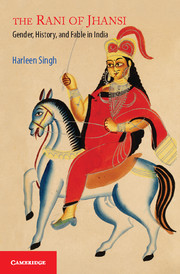Book contents
- Frontmatter
- Dedication
- Contents
- List of Figures
- Acknowledgements
- I Introduction
- II Enslaving Masculinity: Rape Scripts and the Erotics of Power
- III India's Aryan Queen: Colonial Ambivalence and Race in the Mutiny
- IV Coherent Pasts in Hindi Literature and Film
- V Unmaking the Nationalist Archive: Gender and Dalit Historiography
- Afterword
- Bibliography
- Index
I - Introduction
Published online by Cambridge University Press: 05 July 2014
- Frontmatter
- Dedication
- Contents
- List of Figures
- Acknowledgements
- I Introduction
- II Enslaving Masculinity: Rape Scripts and the Erotics of Power
- III India's Aryan Queen: Colonial Ambivalence and Race in the Mutiny
- IV Coherent Pasts in Hindi Literature and Film
- V Unmaking the Nationalist Archive: Gender and Dalit Historiography
- Afterword
- Bibliography
- Index
Summary
‘The Rani of Jhansi asks me from the grave / Are we free and equal at last?’
Sujata VenkatramanRani Lakshmi Bai, the Queen of Jhansi, led her army against the British in 1857. The death of the king, Gangadhar Rao, had left the throne without a natural heir. The East India Company denied recognition to the adopted prince, or to the Queen as his regent and annexed the kingdom. Undeterred, Rani Lakshmi Bai took the reins of government, reorganised her forces and fought the colonialists. A figure of loss but not of defeat, the Rani lost her family, her kingdom and died in battle, but she also became a legendary figure in Indian history.
The 1857 rebellion is a watershed event in Indo-British colonial history that marked India's transformation from a mercantile colony to a dominion of the British crown and has since occupied an inordinately contested space in both British and Indian cultural mythology. Considered the ‘First War of Independence’ by nationalists and derided merely as a ‘Mutiny’ by colonial historiography, the rebellion has continued to provide a fraught terrain for the opposing transactions of British imperialism and Indian nationalism. On that discursive battlefield, the Rani herself, as the subject of numerous English romance novels, as a topic of debate in historical narratives, as the mobilising spirit in the rhetoric of Indian patriotism and as a celebrated figure in folk ballads and theatre, embodies an enduring enigma.
- Type
- Chapter
- Information
- The Rani of JhansiGender, History, and Fable in India, pp. 1 - 32Publisher: Cambridge University PressPrint publication year: 2014



